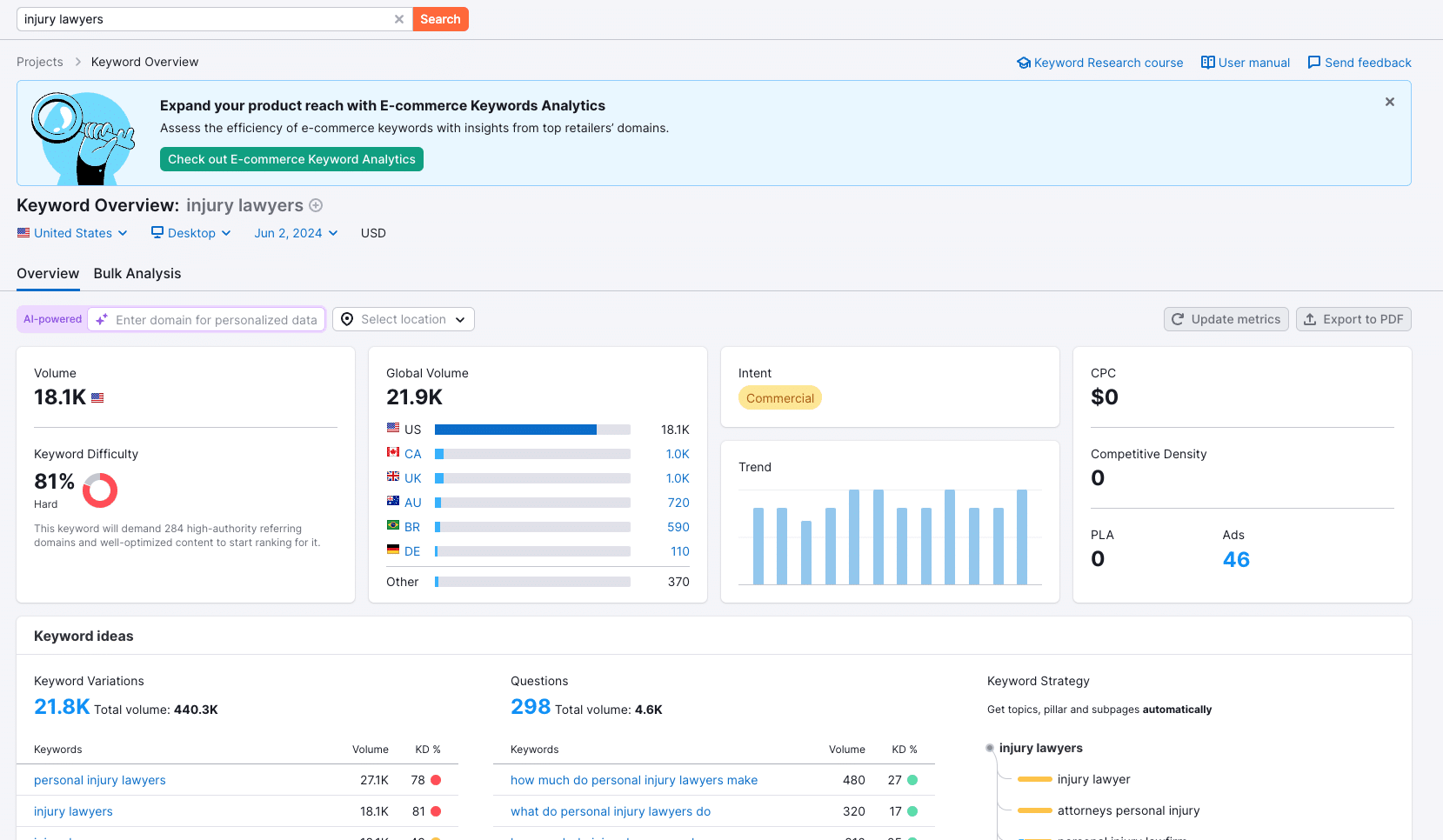
Are you looking for an seo company for lawyers ? No problem, our agency can help you increase your law practice office in search engine rankings giving you more leads. Get in touch with our team, and lets schedule a call.
Key takeaways
- Optimizing for local SEO is crucial for personal injury lawyers to attract relevant clients by enhancing visibility in local search queries.
- Improving website speed and performance significantly enhances user experience, contributing to higher SEO rankings and retaining potential clients’ attention.
- Creating high-quality, relevant content establishes your firm as a trustworthy authority in personal injury law, attracting and engaging potential clients.
- Mobile optimization is essential as more people use smartphones for searches; a mobile-friendly website ensures a positive experience for all users.
- Monitoring SEO performance with tools like Google Analytics and Search Console is vital for understanding the effectiveness of your strategies and making informed adjustments.
If you need seo services for your personal injury law business, then we offer the best seo packages, and can help with any type of website. Lets rank your site and increase your ROI and number of leads, and sales.
Introduction to SEO for Personal Injury Lawyers
In the competitive world of personal injury law, standing out online is crucial. Search Engine Optimization (SEO) is the key to increasing visibility and attracting potential clients. By optimizing your website and content for search engines, you can rank higher in search results, driving more traffic to your site.
Effective SEO strategies can transform a legal practice by connecting lawyers with individuals actively seeking legal assistance. This digital marketing approach ensures your services are visible at the exact moment potential clients are searching for them.
Understanding the Importance of SEO
Personal injury attorney seo is more than just a buzzword; it’s an essential component of digital marketing. A well-optimized website helps your firm appear in top search results, making it easier for clients to find you. The right keywords and SEO tactics put your firm in front of a targeted audience, significantly increasing your chances of engagement.
Moreover, SEO builds credibility and trust. Websites that appear at the top of search results are often perceived as more reputable. By optimizing your site, you’re also enhancing the user experience, which Google rewards with higher rankings.
How SEO Can Transform Your Legal Practice
Implementing SEO strategies leads to increased visibility and website traffic, which can result in more client inquiries and cases. Personal injury lawyers who prioritize SEO can differentiate themselves in a saturated market, highlighting their expertise and success stories to potential clients.
Furthermore, SEO provides measurable results through tools like Google Analytics, allowing firms to understand what works and refine their strategies over time. This continuous improvement cycle fosters growth and keeps your practice competitive.

Tip 1: Optimize Your Website for Local SEO
Local SEO is pivotal for personal injury lawyers. Most clients look for legal services within their geographical area. By optimizing for local SEO, you ensure your firm appears in local search queries, leading to more relevant inquiries and clients.
Claim Your Google My Business Listing
Claiming and optimizing your Google My Business (GMB) listing is the first step towards local SEO success. Ensure your firm’s name, address, and phone number (NAP) are accurate and consistent across the web. Add photos, services, and encourage satisfied clients to leave positive reviews.
GMB listings also allow you to post updates and engage directly with clients through questions and answers. Regular activity and positive reviews improve your listing’s visibility and attractiveness to potential clients.
Incorporate Local Keywords
Incorporating local keywords into your website’s content, titles, and meta descriptions makes your site more relevant to local searches. Use keywords that reflect your practice areas combined with geo-specific terms, such as “personal injury lawyer in [City Name]” or “[City Name] accident attorney.”
Keyword research tools can help identify the most effective local keywords for your practice. Consistently using these keywords throughout your site helps improve your local search rankings, making it easier for clients in your area to find you.

Tip 2: Improve Website Speed and Performance
A fast-loading website is critical for keeping potential clients engaged. Slow websites lead to high bounce rates, negatively affecting your SEO rankings. Focus on optimizing your site’s speed to enhance user experience and improve your search engine performance.
Use a Reliable Hosting Service
Choosing a reliable hosting service is foundational to website performance. A good hosting provider ensures your website loads quickly and remains accessible around the clock. Consider investing in premium hosting solutions tailored for high-traffic websites to keep your site running smoothly.
Moreover, selecting a host with servers close to your target audience can significantly reduce load times. Faster load times improve user experience and contribute positively to your site’s SEO ranking.
Optimize Images and Use Caching
Large images can slow down your website. Optimize images for the web by compressing them without sacrificing quality. Tools like Adobe Photoshop or free online services can reduce file sizes, speeding up your site’s loading time.
Implementing caching can also improve site performance. Caching stores copies of your site’s files, allowing subsequent visits to load much faster. Utilize a caching plugin or service to make your website more efficient and user-friendly.

Tip 3: Create High-Quality, Relevant Content
Content is king in the realm of SEO. High-quality, relevant content attracts and engages potential clients, establishing your firm as a trusted authority in personal injury law. Focus on creating informative and compelling content that addresses the needs and questions of your target audience.
Blog About Legal Advice and Case Studies
Maintaining a blog is a fantastic way to showcase your expertise and provide valuable information to your audience. Cover topics relevant to personal injury claims, offer legal advice, and discuss recent case studies. This not only helps with SEO but also builds trust with potential clients.
Use keywords strategically in your blog posts to improve their visibility in search results. However, ensure your content remains informative and engaging, rather than just a vehicle for keyword placement.
Use Keywords Strategically in Your Content
Keyword strategy extends beyond blog posts. Include relevant keywords in your website’s main pages, FAQs, and case descriptions. However, avoid keyword stuffing, which can penalize your SEO efforts. Instead, integrate keywords naturally into high-quality, informative content.
Conducting regular keyword research helps you stay updated on what potential clients are searching for. Use these insights to tailor your content, making it more relevant and visible to those in need of personal injury legal services.

Tip 4: Optimize for Mobile Users
With the increasing use of smartphones, mobile optimization is crucial for SEO. A mobile-friendly website ensures a positive browsing experience for users on any device, which is essential for keeping potential clients engaged and improving your SEO rankings.
Make Your Website Mobile-Friendly
Ensure your website design is responsive, meaning it automatically adjusts to fit the screen size of any device. This improves usability and satisfaction for mobile users, who are a significant portion of your audience. Google prioritizes mobile-friendly websites in its rankings, making this a critical SEO consideration.
Test your website’s mobile responsiveness regularly using tools like Google’s Mobile-Friendly Test. This helps identify and fix any issues, ensuring your site remains accessible and appealing to all users.
Test Your Site’s Mobile Responsiveness
Regular testing of your site’s mobile responsiveness ensures that all elements function correctly on various devices. Pay attention to loading times, ease of navigation, and the accessibility of key information. A mobile-responsive site not only aids in SEO but also enhances user experience, encouraging longer visits and increased engagement.
Addressing any issues promptly keeps your website competitive and in line with SEO best practices. Remember, a positive mobile experience is crucial for converting visitors into clients.

Tip 5: Use Backlinks Wisely
Backlinks are a cornerstone of SEO strategy. High-quality backlinks from reputable sites signal to search engines that your content is valuable and trustworthy, boosting your rankings. Focus on building a solid backlink profile to enhance your SEO efforts.
Build Relationships with Related Businesses and Blogs
Networking with related businesses and blogs can lead to valuable backlink opportunities. Collaborate on content, participate in community events, or offer to write guest posts. These activities can result in natural, high-quality backlinks that improve your SEO performance.
Remember, the quality of backlinks matters more than quantity. Focus on securing links from authoritative sites within the legal industry or related fields to maximize the impact on your rankings.
Guest Post on Reputable Legal Websites
Guest posting on reputable legal websites is an effective way to gain backlinks and exposure. Offer valuable insights and information that their audience will find useful. This not only provides a backlink but also positions you as an expert in your field.
Ensure your guest posts are informative and relevant, reflecting the quality and expertise of your legal practice. This approach benefits your SEO and enhances your reputation within the legal community.
Tip 6: Leverage Social Media
Social media platforms offer powerful tools for engaging with your audience and driving traffic to your website. While social signals are not a direct ranking factor for SEO, the visibility and engagement they generate can indirectly benefit your SEO efforts.
Engage with Your Audience on Multiple Platforms
Establish a presence on platforms where your potential clients are most active, such as Facebook, LinkedIn, and Twitter. Share your content, engage in discussions, and respond to comments and messages. This interaction builds relationships and encourages visits to your website.
Consistent engagement on social media increases your visibility, driving more traffic to your site. This, in turn, signals to search engines that your content is valuable, potentially improving your SEO rankings.
Share Your Content and Legal Insights
Use social media to share your blog posts, legal insights, and success stories. This content can attract attention and encourage shares, further increasing your reach. Highlighting your expertise through informative content can lead to more website visits and inquiries.
Additionally, consider using targeted ads to reach potential clients who may not yet be aware of your firm. Social media ads can be a cost-effective way to increase visibility and drive targeted traffic to your website.
Tip 7: Implement Schema Markup for Rich Snippets
Schema markup helps search engines understand the content of your website, potentially leading to rich snippets in search results. These enhanced descriptions can improve your click-through rates by making your listings more informative and attractive.
Use Structured Data to Highlight Reviews and Ratings
Incorporating schema markup for reviews and ratings can make your search listings stand out. Displaying star ratings and client testimonials directly in search results builds trust and encourages clicks. Use schema markup to highlight these elements on your website.
Rich snippets containing reviews and ratings provide potential clients with valuable information at a glance. This can be a decisive factor in choosing your firm over competitors, enhancing both SEO and client conversion rates.
Mark Up Your Articles and Attorney Bios
Using schema markup for your articles and attorney bios helps search engines better understand and display your content. This can lead to more informative search results, showcasing your expertise and services directly in the search listings.
Well-structured data for your content and bios enhances visibility and user engagement. By providing clear and detailed information in search results, you attract more qualified traffic to your site.
Tip 8: Monitor Your SEO Performance
Monitoring your SEO performance is essential for understanding the effectiveness of your strategies. Use tools like Google Analytics and Search Console to track your website’s traffic, rankings, and engagement metrics. This data is invaluable for making informed decisions and adjustments to your SEO approach.
Utilize Google Analytics and Search Console
Google Analytics offers deep insights into your website’s performance, including visitor behavior, traffic sources, and content engagement. Use this information to refine your content strategy and improve user experience.
Google Search Console helps you monitor your site’s presence in Google search results. It highlights issues that could impact your rankings and provides data on how people find your site. Regularly reviewing and acting on this information is crucial for SEO success.
Adjust Strategies Based on Data Insights
SEO is not a set-and-forget strategy. It requires ongoing adjustment and optimization based on performance data. Analyze the insights from Google Analytics and Search Console to understand what’s working and what needs improvement.
Be prepared to tweak your content, keywords, and technical SEO elements to better align with search engine algorithms and user behavior. Staying adaptable and responsive to data insights ensures your SEO strategy remains effective over time.

Conclusion
Implementing these eight SEO tips can significantly increase your personal injury law firm’s online visibility and client engagement. From optimizing for local search to leveraging social media, each strategy plays a crucial role in enhancing your digital presence.
SEO is a long-term commitment with evolving challenges and opportunities. By staying informed and adapting to new trends, your law firm can achieve sustained growth and success in the highly competitive online legal marketplace.
If you need seo services for your personal injury law business, then we offer the best seo packages, and can help with any type of website. Lets rank your site and increase your ROI and number of leads, and sales.
Why does seo for personal injury lawyers matter
SEO (Search Engine Optimization) for personal injury lawyers is crucial because it significantly enhances their visibility to potential clients at a critical moment—when they are actively seeking legal assistance. The personal injury law field is highly competitive, and a strong online presence can differentiate a law firm from its competitors. By optimizing their website and content to rank higher in search engine results, personal injury lawyers can increase their chances of being contacted by those in need of legal representation. Effective SEO strategies help ensure that a law firm’s site appears in top search results for relevant queries, thereby increasing website traffic, client leads, and potentially, conversions into actual cases. This ultimately contributes to the growth and profitability of the practice.
Do you need seo services for personal injury lawyers ? No problem, check out our seo packages and choose one.








